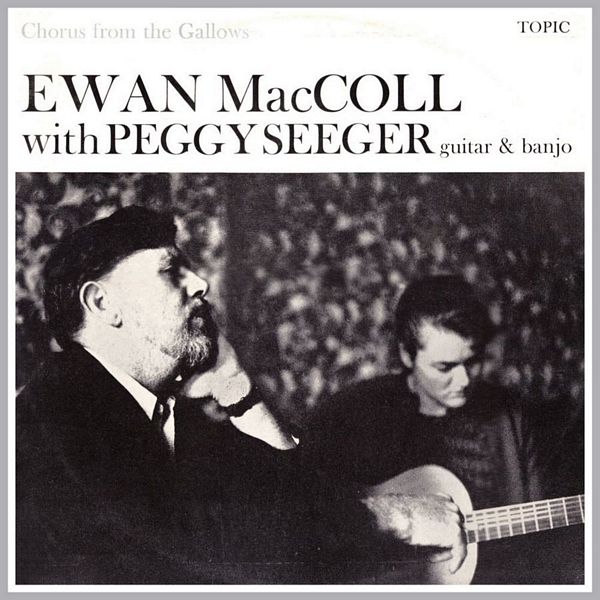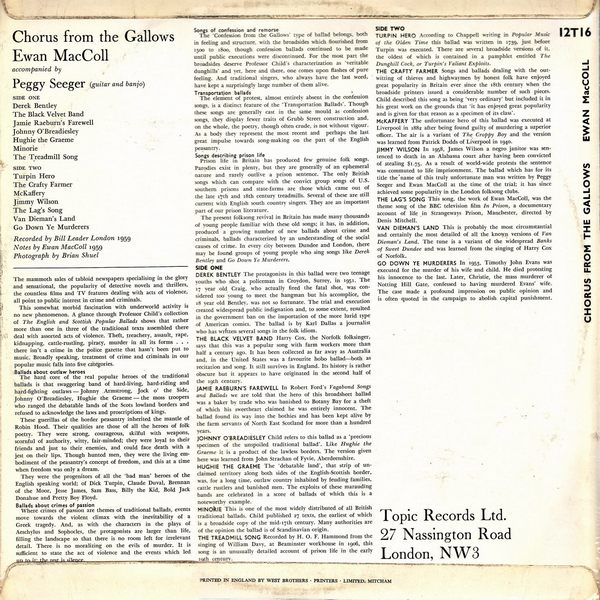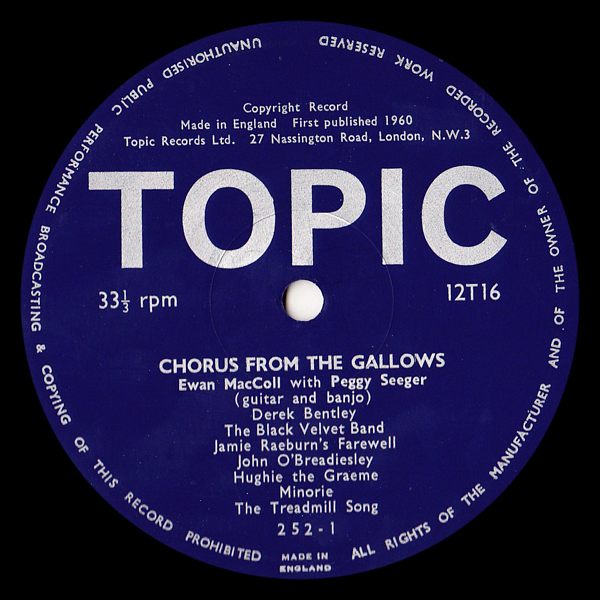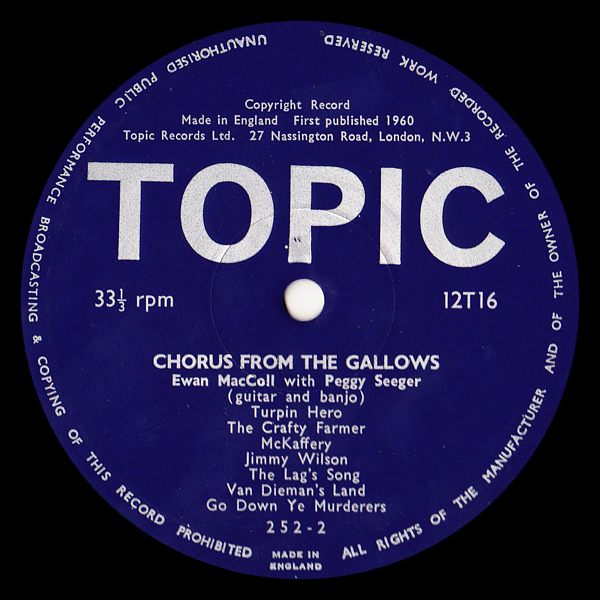

 |


 |
Sleeve Notes
The mammoth sales of tabloid newspapers specialising in the glory and sensational, the popularity of detective novels and thrillers, the countless films and TV features dealing with acts of violence, all point to public interest in crime and criminals.
This somewhat morbid fascination with underworld activity is no new phenomenon. A glance through Professor Child's collection of The English and Scottish Popular Ballads shows that rather more than one in three of the traditional texts assembled there deal with assorted acts of violence. Theft, treachery, assault, rape, kidnapping, cattle-rustling, piracy, murder in all its forms . . . there isn't a crime in the police gazette that hasn't been put to music. Broadly speaking, treatment of crime and criminals in our popular music falls into five categories.
Ballads about outlaw heroes
The hard core of the real popular heroes of the traditional ballads is that swaggering band of hard-living, hard-riding and hard-fighting outlaws — Johnny Armstrong, Jock o' the Side, Johnny O'Breadiesley, Hughie the Graeme — the moss troopers who ranged the debatable lands of the Scots lowland borders and refused to acknowledge the laws and proscriptions of kings.
These guerillas of the border peasantry inherited the mantle of Robin Hood. Their qualities are those of all the heroes of folk poetry. They were strong, courageous, skilful with weapons, scornful of authority, witty, fair-minded; they were loyal to their friends and just to their enemies, and could face death with a jest on their lips. Though hunted men, they were the living embodiment of the peasantry's concept of freedom, and this at a time when freedom was only a dream.
They were the progenitors of all the 'bad man' heroes of the English speaking world; of Dick Turpin, Claude Duval, Brennan of the Moor, Jesse James, Sam Bass, Billy the Kid, Bold Jack Donahue and Pretty Boy Floyd.
Ballads about crimes of passion Where crimes of passion are themes of traditional ballads, events move towards the violent climax with the inevitability of a Greek tragedy. And, as with the characters in the plays of Aeschylus and Sophocles, the protagonists are larger than life, filling the landscape so that there is no room left for irrelevant detail. There is no moralizing on the evils of murder. It is sufficient to state the act of violence and the events which led up to it: the rest is silence.
Songs confession and remorse
The 'Confession from the Gallows' type of ballad belongs, both in feeling and structure, with the broadsides which flourished from 1500 to 1800. though confession ballads continued to be made until public executions were discontinued. For the most part the broadsides deserve Professor Child's characterization as 'veritable dunghills" and yet, here and there, one comes upon flashes of pure feeling. And traditional singers, who always have the last word, have kept a surprisingly large number of them alive.
Transportation ballads
The element of protest, almost entirely absent in the confession songs, is a distinct feature of the 'Transportation Ballads'. Though these songs are generally cast in the same mould as confession songs, they display fewer traits of Grubb Street construction and, on the whole, the poetry, though often crude, is not without vigour. As a body they represent the most recent and perhaps the last great impulse towards song-making on the part of the English peasantry.
Songs describing prison life
Prison life in Britain has produced few genuine folk songs. Parodies exist in plenty, but they are generally of an ephemeral nature and rarely outlive a prison sentence. The only British songs which can compare with the convict group songs of U.S. southern prisons and state-farms are those which came out of the late 17th and 18th century treadmills. Several of these are still current with English south country singers. They are an important part of our prison literature.
The present folksong revival in Britain has made many thousands of young people familiar with these old songs; it has, in addition, produced a growing number of new ballads about crime and criminals, ballads characterized by an understanding of the social causes of crime. In every city between Dundee and London, there may be found groups of young people who sing songs like Derek Bentley and Go Down Ye Murderers.
DEREK BENTLEY — The protagonists in this ballad were two teenage youths who shot a policeman in Croydon, Surrey, in 1951. The 17 year old Craig, who actually fired the fatal shot, was considered too young to meet the hangman but his accomplice, the 18 year old Bentley. was not so fortunate. The trial and execution created widespread public indignation and, to some extent, resulted in the government ban on the importation of the more lurid type of American comics. The ballad is by Karl Dallas a journalist who has written several songs in the folk idiom.
THE BLACK VELVET BAND — Harry Cox, the Norfolk folksinger, says that this was a popular song with farm workers more than half a century ago. It has been collected as far away as Australia and, in the United States was a favourite hobo ballad — both as recitation and song. It still survives in England. Its history is rather obscure but it appears to have originated in the second half of the 19th century.
JAMIE RAEBURN'S FAREWELL — In Robert Ford's Vagabond Songs and Ballads we are told that the hero of this broadsheet ballad was a baker by trade who was banished to Botany Bay for a theft of which his sweetheart claimed he was entirely innocent. The ballad found its way into the bothies and has been kept alive by the farm servants of North East Scotland for more than a hundred years.
JOHNNY O'BREADIESLEY — Child refers to this ballad as a 'precious specimen of the unspoiled traditional ballad'. Like Hughie the Graeme it is a product of the lawless borders. The version given here was learned from John Strachan of Fyvie, Aberdeenshire.
HUGHIE THE GRAEME — The 'debatable land', that strip of unclaimed territory along both sides of the English-Scottish border, was, for a long time, outlaw country inhabited by feuding families, cattle rustlers and banished men. The exploits of these marauding bands are celebrated in a score of ballads of which this is a noteworthy example.
MINORIE — This is one of the most widely distributed of all British traditional ballads. Child published 27 texts, the earliest of which is a broadside copy of the mid-17th century. Many authorities are of the opinion the ballad is of Scandinavian origin.
THE TREADMILL SONG — Recorded by H. O. F. Hammond from the singing of William Davy, at Beaminster workhouse in 1906, this song is an unusually detailed account of prison life in the early 19th century.
TURPIN HERO — According to Chappell writing in Popular Music of the Olden Time this ballad was written in 1739. just before Turpin was executed. There are several broadside versions of it, the oldest of which is contained in a pamphlet entitled The Dunghill Cock, or Turpin's Valiant Exploits.
THE CRAFTY FARMER — Songs and ballads dealing with the outwitting of thieves and highwaymen by honest folk have enjoyed great popularity in Britain ever since the 18th century when the broadside printers issued a considerable number of such pieces. Child described this song as being 'very ordinary' but included it in his great work on the grounds that 'it has enjoyed great popularity and is given for that reason as a specimen of its class'.
McKAFFERY — The unfortunate hero of this ballad was executed at Liverpool in 1882 after being found guilty of murdering a superior officer. The air is a variant of The Croppy Boy and the version was learned from Patrick Dodds of Liverpool in 1940.
JIMMY WILSON — In 1958, James Wilson a negro janitor was sentenced to death in an Alabama court after having been convicted of stealing $1.75. As a result of world-wide protests the sentence was commuted to life imprisonment. The ballad which has for its title the name of this truly unfortunate man was written by Peggy Seeger and Ewan MacColl at the time of the trial; it has since achieved some popularity in the London folksong clubs.
THE LAG'S SONG — This song, the work of Ewan MacColl, was the theme song of the BBC television film In Prison, a documentary account of life in Strangeways Prison, Manchester, directed by Denis Mitchell.
VAN DIEMAN'S LAND — This is probably the most circumstantial and certainly the most detailed of all the known versions of Van Dieman's Land. The tune is a variant of the widespread Banks of Sweet Dundee and was learned from the singing of Harry Cox of Norfolk.
GO DOWN YE MURDERERS — In 1953, Timothy John Evans was executed for the murder of his wife and child. He died protesting his innocence to the last. Later, Christie, the mass murderer of Netting Hill Gate, confessed to having murdered Evans' wife. The case made a profound impression on public opinion and is often quoted in the campaign to abolish capital punishment.